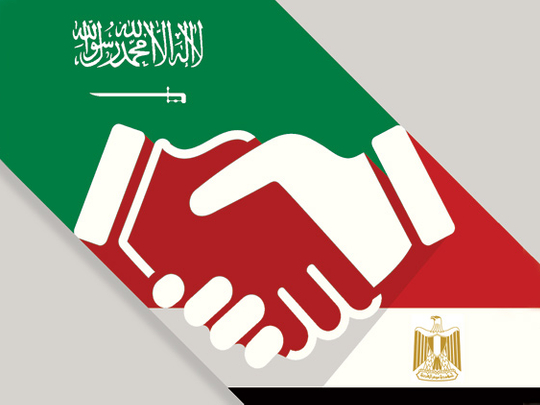
Nearly 90 years old and in relatively frail health, King Abdullah Bin Abdul Aziz Al Saud showed, once again, his iron-clad “will to power” when he made a brief stop in Cairo last Friday. On his way back to the kingdom from a short Moroccan sojourn, the Saudi monarch received President Abdul Fattah Al Sissi on his plane, exchanged views with the latter, vowed to strengthen their alliance, and otherwise signalled to one and all that, despite advanced age, he was still attentive. Both, Foreign Minister Prince Saudi Al Faisal and National Security Council Advisor Prince Bandar Bin Sultan were present.
Al Sissi entered the plane’s salon where the Saudi monarch welcomed him, kissed the elderly king on the forehead as a sign of respect and affection and engaged his host in a solid conversation that addressed how to best tackle extremist threats that preoccupied both. Interestingly, and while most analysts concluded that this was little more than a photo opportunity, in reality, Abdullah transformed the brief session into a concrete policy initiative.
To be sure, comparisons between the 2014 Abdullah-Al Sissi meeting onboard the ruler’s plane and the 1945 Abdul Aziz Bin Abdul Rahman-Franklin Delano Roosevelt encounter in Egyptian waters filled Arab newspapers, although the two summits were substantively different. If the founder-monarch searched for permanent friendship between his country and the US, while Washington sought access to Saudi Arabia’s immense oil resources, the friendship between Saudi Arabia and Egypt was so well ingrained that few doubted that Riyadh and Cairo would alter policies towards each other. Rather, what the two men sealed was to refine and strengthen the strategic commitments that both countries made to each other, which in 2014 concentrated on fighting extremists.
This was no idle chatter, but an understanding that, in the post-2011 Arab world, Riyadh and Cairo ought to lead this existential struggle to best serve the Arab and Muslim worlds. Indeed, at a time when the Arab world is mired in a real tussle — between revolutionary forces led by Iranian mullahs and their jihadist counterparts, including the Muslim Brotherhood, the Jabhat Al Nusra, the Islamic State of Iraq and the Levant (Isil) that, for all practical purposes, enlarged the arena and granted the latter far more legitimacy than many assumed — the challenge was to prevent their growths.
Ironically, it just took two days for Iranian President Hassan Rouhani to issue a blatant warning to Saudi Arabia and its Gulf Cooperation Council allies to stop channeling “petrodollars” to such organisations, though Tehran was equally miffed at Cairo’s treatment of the Muslim Brotherhood and Hezbollah operatives’ arrests in Egypt. Rouhani did not name any specific country in his carefully planned announcement, though Iranian officials and their numerous acolytes pointed their fingers at Saudi Arabia and Qatar, in particular, for providing financial and military assistance to such groups. “I advise Muslim countries that support the terrorists with their petrodollars to stop,” Rouhani declared, because “tomorrow you will be targeted ... by these savage terrorists.” He added: “Wash your hands of killing and the killing of Muslims,” though he failed to refer to Tehran’s massive support to Hezbollah in Lebanon; the Baath regime in Syria, where at least 160,000 have fallen victim so far; and the hugely compromised Nouri Al Maliki government’s unending wars in Iraq. Somehow, none of these qualified “of killing and the killing of Muslims”, since Iran, the predominant Shiite powerhouse in the Middle East, only supported Hezbollah, Damascus and Baghdad for humanitarian reasons.
Rouhani, who called for unity between “Shiites and Sunnis [because all Muslims] were brothers”, remained oblivious to his country’s sectarian policies at home and throughout the region — something that no objective observer could deny. In the event, ethnic harmony was an elusive objective, even if mistreatments existed and dormant antagonisms surfaced with a vengeance from time to time. Still, it was worth noting that whatever differences existed between Sunnis and Shiites, they were neither religious nor cultural, but purely political since Iranians, both as a people as well as successive governments, have always displayed condescension towards Arabs.
As the Custodian of the Two Holy Mosques and the leader of the most important Arab country, King Abdullah is a careful man and draws his legitimacy from intrinsic pledges to Islam and Arabism. Like his predecessors and, inevitably, something that all of his successors will emulate, the Saudi monarch led a nation that valued these two invariable principles, which were now further strengthened in the nascent alliance with Cairo. By stopping in Egypt, King Abdullah signalled to the world that he understood the country’s importance and had no compunction to back Al Sissi when the latter took serious risks as Field Marshal against the Muslim Brotherhood. It may well be that few realised the dangers associated with extremist groups that intended to take the Arab and Muslim worlds back in time, though Abdullah did, as he also realised that the tug-of-war underway would neither be easy to address nor cost-free to overcome. That was the reason why his government classified the Muslim Brotherhood as a terrorist organisation.
A 90-year old has got it, which is a true blessing, even as Arab leaders grapple with the consequences of the post-Arab Spring era. Nations sometimes get lucky when providence entrusts the reigns of authority to real men who loathe temporary gains and popularity contests. Sometimes, such nations preserve their interests, build on existing alliances and forge successful friendships. Sometimes, all three occur simultaneously, which is always the icing on the cake.
Dr Joseph A. Kechichian is the author of Legal and Political Reforms in Saudi Arabia (London: Routledge, 2013).











